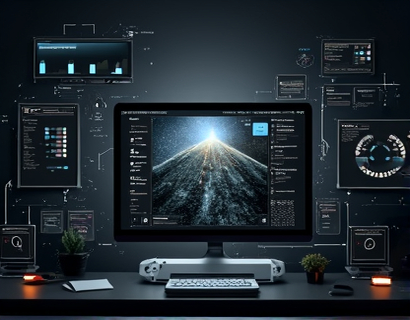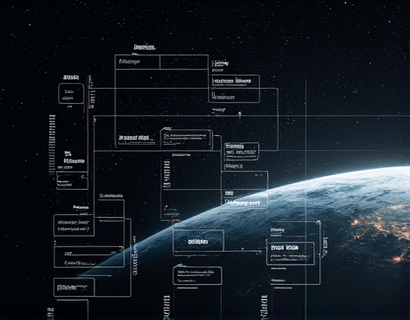Real-Time Government Data: Empowering Civic Participation Through Open Access and Accountability
The advent of real-time government data access represents a pivotal shift in the landscape of civic engagement and governance. This transformation is driven by the principles of openness and transparency, which are increasingly recognized as cornerstones of a healthy democracy. By providing citizens with immediate and direct access to government data, open data initiatives are revolutionizing the way people participate in civic life and hold their leaders accountable.
Open data initiatives, which involve the publication of government data in accessible and usable formats, have gained momentum globally. These initiatives are not merely about making data available; they are about creating a culture of transparency and collaboration. The availability of real-time data empowers citizens to engage more meaningfully with government processes, fostering a more informed and active citizenry. This article delves into the transformative impact of real-time data access on governance, exploring how open data drives informed citizen participation and enhances accountability in democratic processes.
The Importance of Real-Time Data in Governance
Real-time data is crucial for several reasons. Firstly, it ensures that the information citizens receive is current and relevant. In a rapidly changing world, delays in data publication can lead to outdated decisions and policies. Real-time data, on the other hand, allows for timely responses to emerging issues, whether they are related to public health, environmental monitoring, or economic trends. This immediacy is particularly vital in crisis situations, where swift and informed action can make a significant difference.
Secondly, real-time data enhances transparency. When government data is updated continuously, citizens can track changes and developments as they happen. This level of transparency builds trust between the government and its citizens. It demonstrates a commitment to openness and accountability, which are essential for maintaining public confidence in government institutions. Transparency also deters corruption and misuse of power, as actions and decisions are more visible and subject to scrutiny.
Driving Informed Citizen Participation
One of the most significant impacts of real-time government data is its role in driving informed citizen participation. With access to up-to-date information, citizens can make more informed decisions about the issues that affect their communities. This empowerment is particularly evident in areas such as urban planning, public health, and environmental conservation.
For instance, real-time data on air quality can alert citizens to pollution levels, enabling them to take necessary precautions to protect their health. Similarly, real-time transit data helps commuters plan their journeys more efficiently, reducing congestion and improving overall transportation systems. In the realm of public health, real-time data on disease outbreaks can inform individuals about potential risks and guide public health responses.
Moreover, real-time data facilitates greater civic engagement by providing the tools and information needed for active participation. Citizens can use this data to monitor government performance, identify areas for improvement, and advocate for change. Online platforms and applications that leverage real-time government data make it easier for citizens to engage in the democratic process, from participating in surveys and polls to submitting feedback and suggestions.
Enhancing Accountability in Democratic Processes
Real-time government data also plays a crucial role in enhancing accountability within democratic processes. Accountability is a fundamental principle of democracy, ensuring that elected officials and government agencies are responsible for their actions and decisions. Real-time data provides the necessary transparency to hold these entities accountable.
By making government operations more transparent, real-time data allows citizens to track the implementation of policies and projects. This visibility makes it easier to identify when promises are not being kept or when resources are not being used effectively. For example, real-time budget tracking tools enable citizens to monitor how public funds are allocated and spent, reducing the risk of mismanagement and corruption.
Furthermore, real-time data supports independent monitoring and evaluation. Non-governmental organizations, researchers, and media outlets can use this data to conduct thorough analyses and reports, providing the public with a comprehensive understanding of government performance. This external scrutiny acts as a check on government actions, ensuring that officials remain accountable to the citizens they serve.
Case Studies: Real-World Impact of Real-Time Data
Several cities and countries have successfully implemented real-time data initiatives, demonstrating their transformative impact. One notable example is the city of Barcelona, which has embraced the concept of "open data" to enhance civic engagement and improve urban management.
Barcelona's Open Data portal provides access to a wide range of government data, including information on public services, transportation, and environmental monitoring. This data is used by citizens, developers, and researchers to create innovative applications and services. For instance, an app developed using Barcelona's real-time transit data helps residents plan their routes more efficiently, reducing travel time and improving overall satisfaction with the public transportation system.
Another example is the United States, where the Federal Government's Data.gov platform offers a vast repository of government data. This platform has been instrumental in fostering innovation and collaboration. Developers and entrepreneurs use the data to create tools that address various societal challenges, from traffic congestion to healthcare access. The platform also supports transparency and accountability by providing the public with insights into government operations and spending.
Challenges and Considerations
While the benefits of real-time government data are clear, there are challenges and considerations that must be addressed to ensure its successful implementation. One of the primary challenges is data quality and accuracy. Real-time data must be reliable and consistent to be useful. Governments need to invest in robust data management systems to ensure that the information published is accurate and up-to-date.
Another challenge is data privacy and security. Real-time data often includes sensitive information, and protecting this data from unauthorized access and misuse is crucial. Governments must implement strong security measures and adhere to privacy regulations to maintain public trust. Transparency in data collection and usage practices is essential to address concerns about surveillance and data exploitation.
Additionally, there is a need for digital literacy among citizens. For real-time data to be effectively utilized, citizens must have the skills to access, understand, and interpret the information. Educational initiatives and user-friendly interfaces can help bridge this gap, making real-time data more accessible and beneficial to a broader audience.
Moving Forward: Building a More Transparent and Collaborative Government
The future of governance lies in embracing real-time data and the principles of open access and accountability. By continuing to invest in open data initiatives and addressing the associated challenges, governments can create a more transparent and collaborative environment. This shift not only enhances civic participation but also strengthens democratic institutions.
Citizens play a crucial role in this transformation. By demanding transparency, engaging with real-time data, and using it to hold government accountable, citizens can drive meaningful change. Governments, in turn, must be proactive in providing accessible and useful data, fostering a culture of openness and collaboration.
Together, we can build a future where government operations are transparent, accountable, and responsive to the needs of the people. The movement towards a more transparent and collaborative government is gaining momentum, and real-time government data is at the forefront of this revolution. Join this movement and be part of a brighter, more informed, and more engaged future.










































